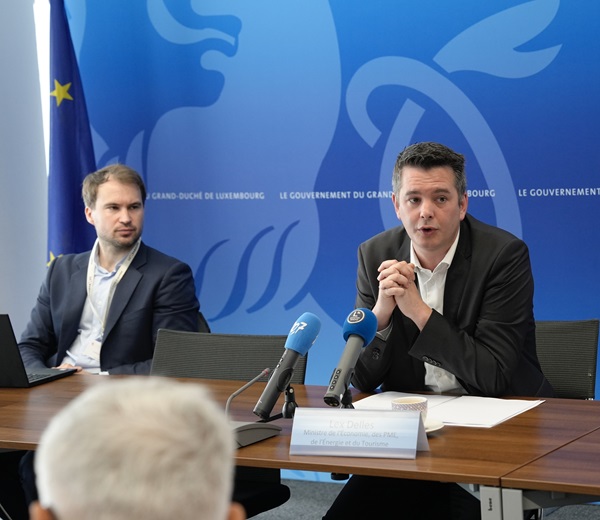 (L-R): Bob Feidt, economic advisor; Lex Delles, Minister of the Economy, SMEs, Energy and Tourism;
Credit: MECO
(L-R): Bob Feidt, economic advisor; Lex Delles, Minister of the Economy, SMEs, Energy and Tourism;
Credit: MECO
On Tuesday 18 June 2024, Luxembourg's Minister of the Economy, SMEs, Energy and Tourism, Lex Delles, presented the reform of the aid system for environmental and climate protection for companies operating in the Grand Duchy.
The bill relating to this reform is part of the plan to accelerate the ecological and energy transition of the Luxembourg economy and to achieve Luxembourg's climate objectives and in particular those of the integrated energy and climate plan (PNEC), particularly in the field of decarbonisation, energy efficiency, the deployment of renewable energies and the security of energy supply in Luxembourg.
In order to achieve these objectives and encourage companies to accelerate their green transition, the reform provides for eight types of investment aid, namely:
- Investment support for environmental protection, including decarbonisation (e.g. electrification of a production line)
- Investment support for the acquisition of new zero-emission road vehicles and the conversion of road vehicles (e.g. electric/hydrogen trucks)
- Investment support for measures promoting energy efficiency outside buildings (e.g. equipment for waste heat recovery)
- Investment support for the promotion of energy produced from renewable sources, renewable hydrogen and high-efficiency cogeneration
- Investment support for efficient heating or cooling networks (e.g. district heating network)
- Investment support for the efficient use of resources and support for the transition to a circular economy (e.g. replacing primary raw materials with secondary ones)
- Investment support for energy infrastructure (e.g. future hydrogen transport network)
- Support for studies and consultancy services on issues related to environmental protection and energy
With the aim of reducing the consumption of fossil fuels, investments in assets producing, consuming or transporting fossil fuels are excluded from aid schemes or strictly regulated in exceptional cases without endangering the 2050 decarbonisation objective.
In order to better target priority areas and technologies for decarbonization, most new aid is only granted following calls for projects whose precise purpose and budget are previously defined by the Ministry of the Economy. These calls will be launched regularly and continuously in order to support companies in their green transition. Thus, the new aid regime promotes the development of new technologies necessary to achieve climate objectives.
Emphasis is placed on the infrastructures of the future including hydrogen networks and heat/cold networks; today we must set the stage to promote infrastructures that transport innovative renewable energies.
However, the reform of the aid system for environmental and climate protection is not limited to these different types of aid, but also aims at other concrete objectives, such as administrative simplification. The acceleration of the processing of applications will be ensured by setting processing times, establishing more flexible conditions for aid of a small amount (less than €100,000) and integrating the principle according to which silence constitutes agreement. for the granting of aid of a small amount (less than €100,000).
The bill relating to the reform of the aid system for environmental and climate protection was tabled in the Chamber of Deputies; i.e. the aid scheme is not yet in force, but must first go through the legislative procedure. However, the current regime remains in application until the vote on its reform and can be consulted on the site myguichet.lu.
Minister Delles underlined “achieving our climate objectives is closely linked to the ecological and energy transition of Luxembourg companies. Supporting societies in this green transition is one of my political priorities. The reform of the aid system for environmental and climate protection constitutes a major instrument for the transition towards a carbon-neutral economy, in particular through the implementation of targeted aid measures which encourage companies to implement sustainable projects while guaranteeing their competitiveness".








